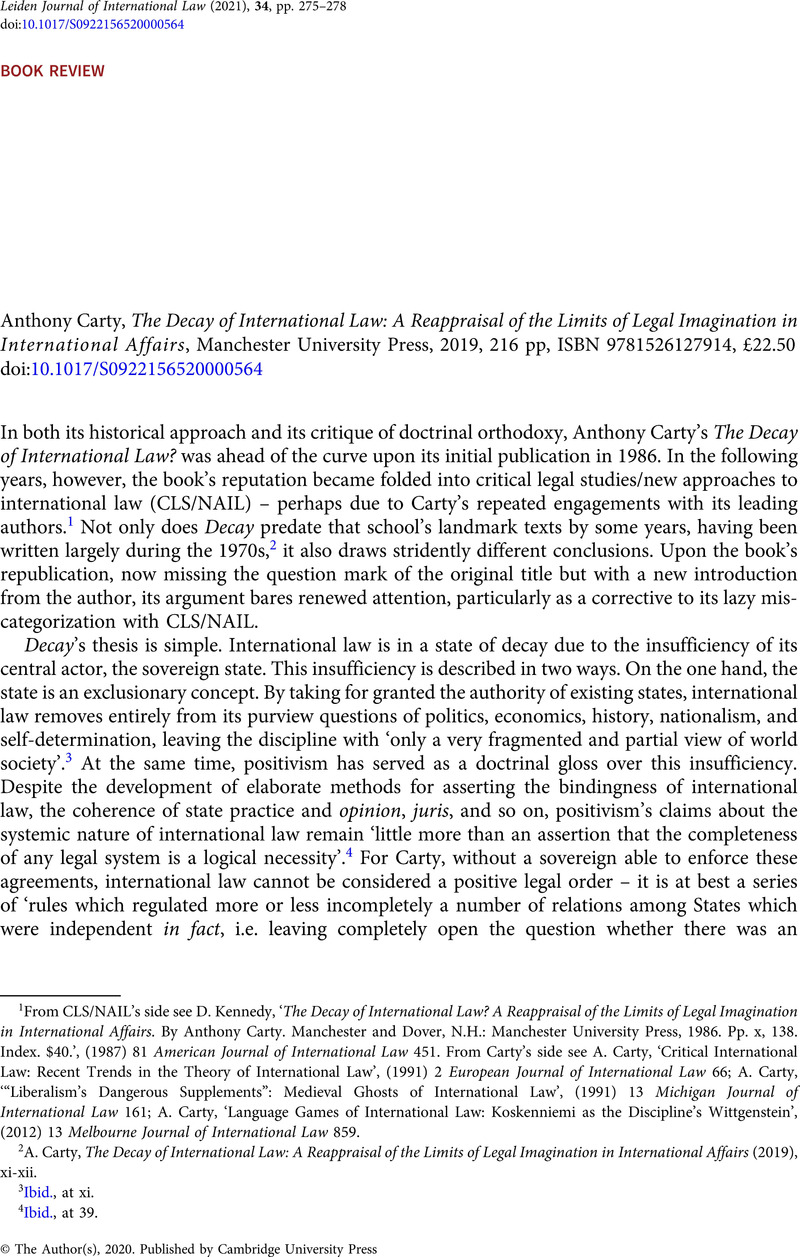No CrossRef data available.
Article contents
Anthony Carty , The Decay of International Law: A Reappraisal of the Limits of Legal Imagination in International Affairs, Manchester University Press, 2019, 216 pp, ISBN 9781526127914, £22.50
Published online by Cambridge University Press: 12 November 2020
Abstract

- Type
- Book Review
- Information
- Copyright
- © The Author(s), 2020. Published by Cambridge University Press
Footnotes
Some of these thoughts were worked out in conversation with Anthony Carty and Jean d’Aspremont at the launch event for the book on 7 February 2020 – my thanks to them both. The usual disclaimer applies.
References
1 From CLS/NAIL’s side see D. Kennedy, ‘The Decay of International Law? A Reappraisal of the Limits of Legal Imagination in International Affairs. By Anthony Carty. Manchester and Dover, N.H.: Manchester University Press, 1986. Pp. x, 138. Index. $40.’, (1987) 81 American Journal of International Law 451. From Carty’s side see A. Carty, ‘Critical International Law: Recent Trends in the Theory of International Law’, (1991) 2 European Journal of International Law 66; A. Carty, ‘“Liberalism’s Dangerous Supplements”: Medieval Ghosts of International Law’, (1991) 13 Michigan Journal of International Law 161; A. Carty, ‘Language Games of International Law: Koskenniemi as the Discipline’s Wittgenstein’, (2012) 13 Melbourne Journal of International Law 859.
2 A. Carty, The Decay of International Law: A Reappraisal of the Limits of Legal Imagination in International Affairs (2019), xi-xii.
3 Ibid., at xi.
4 Ibid., at 39.
5 Ibid., at 46.
6 Ibid., at xi.
7 Ibid., at 93.
8 Ibid., at 166.
9 In particular M. García-Salmones Rovira, The Project of Positivism in International Law (2013). See also A. Orford, ‘Food Security, Free Trade, and the Battle for the State’, (2015) 11 Journal of International Law and International Relations 1; L. Eslava and S. Pahuja, ‘The State and International Law: A Reading from the Global South’, (2020) 11 Humanity 118; Legal Form’s ongoing series on state theory, available at legalform.blog/archive/.
10 Carty, supra note 2, at 168.
11 Ibid., at 188 (emphasis added).
12 A. Carty, Philosophy of International Law (2007).
13 Carty, supra note 2, at 18.
14 Ibid., at 20.
15 Ibid., at 23.
16 Ibid., at 16.
17 Ibid., at 19.
18 Although cf. D. M. Scott and U. Soirila, ‘The Politics of the Moot Court’, forthcoming in the European Journal of International Law, which critically assesses the knowledge practices transmitted and reinforced by moot courts.
19 T. Eagleton, The Function of Criticism (2005), 107. Cf. A. Rasulov, ‘A Marxism for International Law: A New Agenda’, (2018) 29 European Journal of International Law 631.
20 Cf. M. Koskenniemi, ‘The Politics of International Law – 20 Years Later’, (2009) 20 European Journal of International Law 7.


